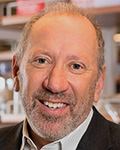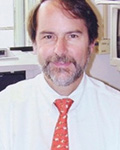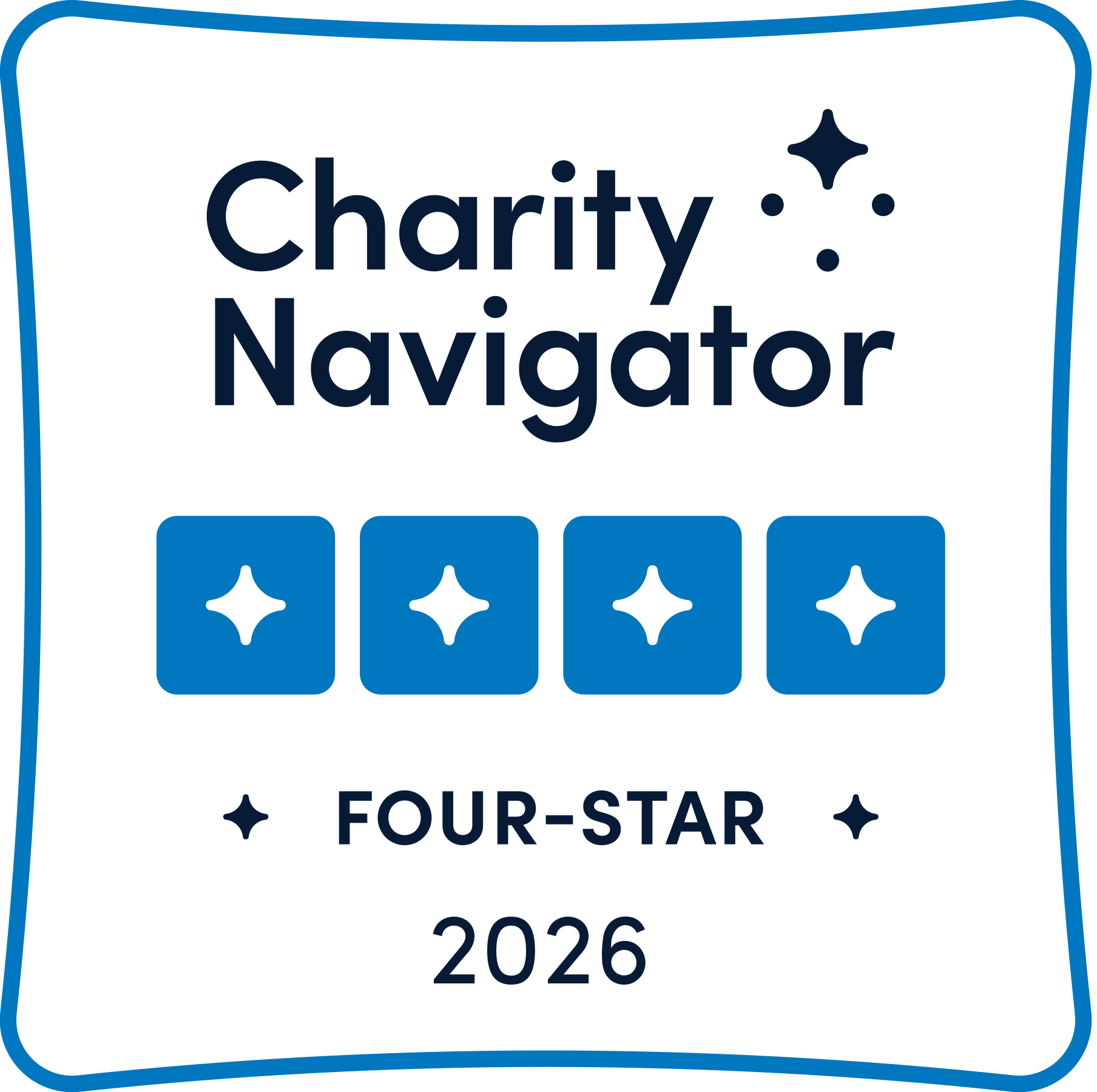2022 Research Achievement Awards
-

Richard Gallo, MD, PhD
University of California, San Diego
2022 David Martin Carter Mentor AwardDr. Richard Gallo is a leading medical scientist in the fields of human immunology, skin biology and the microbiome. He received his post-graduate training at Harvard and is now a Distinguished Professor and the Founding Chairman of the Department of Dermatology at the University of California, San Diego.
His groundbreaking research discovered the existence of antimicrobial peptides in mammalian skin, a field that has now grown to be seen as a major part of clinical medicine. Gallo's work has also revolutionized our knowledge of the function of the skin microbiome, with many research breakthroughs that have greatly advanced understanding of several human skin diseases including atopic dermatitis, rosacea and acne.
He has received major awards from the Society of Investigative Dermatology, the Japanese Society of Investigative Dermatology, the European Societies of Investigative Dermatology as well as several other scientific organizations both within and outside of the field of Dermatology. He has been elected as a fellow of multiple prestigious societies including the American Association for the Advancement of Science, the American Association of Microbiology, the American Association of Clinical Investigation and the American Dermatology Association.
Dr. Gallo is one of the highest cited active investigators in Medicine, with over 40,000 citations from more than 350 publications in prestigious journals including: Nature, Science, New England J. of Medicine, Immunity, Cell Host and Microbe and others.
-

Janet Fairley, MD, FAAD
University of Iowa, Health Care Carver College of Medicine
2022 Research Achievement Award in Autoimmune and Inflammatory Skin DisordersJanet A. Fairley, MD is the John S. Strauss Professor and Head of the Department of Dermatology at the University of Iowa. Dr. Fairley completed medical school, residency training, and a research fellowship at the University of Michigan.
Dr. Fairley’s interests include autoimmune skin diseases, complex medical dermatology, and skin and cutaneous manifestations of systemic illness. She has published over 140 articles and book chapters.
Dr. Fairley is a diplomate of the American Board of Dermatology and a member of the American Academy of Dermatology and the Society for Investigative Dermatology. Dr. Fairley is currently the President of the Dermatology Foundation and the immediate past president of the Society for Investigative Dermatology. Dr. Fairley is also an honorary member of the Société Française de Dermatologie and the recipient of a lifetime achievement award from the Medical Dermatology Society.
-

Fiona Watt FRS, FMedSci
King’s College London, Centre for Gene Therapy & Regenerative Medicine
2022 Research Achievement Award in Melanoma and Skin CancerFiona Watt obtained her first degree from Cambridge University and her DPhil, in cell biology, from the University of Oxford. She was a postdoc at MIT, where she first began studying differentiation and tissue organization in mammalian epidermis.
She established her first research group at the Kennedy Institute for Rheumatology in London and then spent 20 years at the CRUK London Research Institute. She helped to establish the CRUK Cambridge Research Institute and the Wellcome Trust Centre for Stem Cell Research and in 2012 she moved to King's College London to found the Centre for Stem Cells and Regenerative Medicine. In 2022 she moved to Heidelberg where she runs a lab at EMBL and is EMBO Director.
-

Michel Gilliet, MD
CHUV Lausanne University Hospital Switzerland
2022 Research Achievement Award in PsoriasisMichel Gilliet, M.D. is Chair of the Department of Dermatology at the University Hospital CHUV in Lausanne, Switzerland. He received his training in Dermatology at the University of Zürich, Switzerland and his research training in Immunology at the DNAX Research Institute in Palo Alto, California. In 2004, he was recruited to the MD Anderson Cancer Center in Houston, Texas, first as Assistant Professor, then as tenured Associate Professor with a clinical appointment in Dermatology, a translational research appointment in Melanoma Oncology, and a basic science appointment in Immunology. In 2010 he returned to Switzerland as Full Professor and Chair of the Department of Dermatology in Lausanne.
His research has focused primarily on translational research studying immune responses in inflammatory skin diseases and melanoma. In particular, his lab has discovered mechanisms how dendritic cells initiate and drive inflammation in the skin based the complex formation of DNA with antimicrobial peptides. These studies provided a paradigm shift in the understanding how inflammation is regulated in wounded skin and inflammatory diseases such as psoriasis and lupus erythematosus. Dr Gilliet has also been involved in the initial discovery of TSLP and its role in driving allergic inflammation in atopic dermatitis. More recently, his research group has identified a unique innate immune activation pathway in skin lesions of COVID-19 patients and demonstrated its involvement that in the detrimental lung hyperinflammation of severely ill patients. Together, these studies have resulted in more than 120 peer-reviewed publications with over 24,000 citations, including papers published in Nature, Science, Nature Immunology, and Nature Medicine.
Dr. Gilliet has served as Secretary Treasurer (2016-17) and President (2018) of the European Society of Dermatological Research (ESDR) and is honorary member of several international associations including Austria, France and Japan. He is currently President of the Skin Science Foundation and Chair of the Scientific Programming committee of the European Academy of Dermatology and Venereology (EADV). He has received numerous awards, including the Cloetta Prize, the most prestigious Award for Medical Research in Switzerland.
-

Thomas J. Hornyak, MD, PhD
University of Maryland School of Medicine
2022 Research Achievement Award in Vitiligo and Pigment Cell BiologyDr. Hornyak is a physician-scientist who currently serves as Associate Chief of Staff for Research & Development, VA Maryland Health Care System, as well as Associate Professor of Dermatology and Biochemistry and Molecular Biology at the University of Maryland School of Medicine, where he is Chair, Department of Dermatology and holds the Dr. Joseph W. Burnett, Jr. Professorship in Dermatology.
Dr. Hornyak’s research activities have mainly focused upon melanocyte developmental and stem cell biology. He has developed a set of transgenic mouse strains used by his laboratory to define specific roles of transcription factors in melanocyte development and to characterize subsets of melanocyte stem cells from the hair follicle with distinct regenerative properties. His research studies have been funded by awards from NIAMS/NIH; the NIH Intramural Research Program; the Biomedical Laboratory Research & Development Service, VA Office of Research and Development; and the Department of Defense.
Dr. Hornyak also served as President of the Pan-American Society for Pigment Cell Research, the sole domestic scientific society focused upon research on basic mechanisms of pigmentation, from 2017 to 2019.
-

Lawrence Eichenfield, MD
University of California, San Diego
2022 Research Achievement Award in Public Policy and Medical EducationDr. Lawrence F. Eichenfield is a Professor of Dermatology and Pediatrics and Vice Chair of the Department of Dermatology at the University of California San Diego (UCSD) School of Medicine and Chief of Pediatric and Adolescent Dermatology at Rady Children’s Hospital San Diego. He received his medical degree from Mount Sinai School of Medicine in New York, was a pediatric resident and Chief Resident at Children’s Hospital of Philadelphia and completed his dermatology residency at the Hospital of the University of Pennsylvania.
Dr. Eichenfield’s clinical interests include atopic dermatitis, acne, psoriasis, pediatric infections, vascular lesions and hemangiomas, neonatal dermatology, laser surgery, nevi, and skin signs of systemic disease. He has authored more than 450 published journal articles and chapters, is senior editor of textbook Neonatal and Infant Dermatology and serves on the editorial boards of multiple journals and periodicals. Dr. Eichenfield directs the Rady/UCSD Eczema and Inflammatory Skin Disease Center and is co-Director of the Multidisciplinary Atopic Dermatitis Program. He is past president of the Society for Pediatric Dermatology, past Board member of the American Academy of Dermatology, a founder and past Chair of the Pediatric Dermatology Research Alliance (PeDRA), is Vice President of the American Dermatology Association and Chairs the Executive Committee of the Scientific and Medical Advisory Councils of the National Eczema Association.
-

David Woodley, MD
University of Southern California, Keck School of Medicine
2022 Research Achievement Award in DiscoveryDavid T. Woodley, M.D. completed his undergraduate degree in English Literature at Washington University in St. Louis and his medical school education at the University of Missouri in Columbia, Missouri. He completed his dermatology residency training at the University of North Carolina in Chapel Hill, North Carolina. He then completed a Dermatology Research Fellowship in the laboratory of Dr. Michel Prunieras at the Rothschild Foundation and University of Paris in Paris, France. He served as an Expert Investigator at the National Institutes of Health for three years and then returned to Chapel Hill as an Assistant Professor of Dermatology. He left Chapel Hill in 1989 to be Professor and Associate Chair of the Department of Dermatology at Stanford University. In 1992, he was appointed the Walter Hamlin Professor and Chair of Dermatology at Northwestern University. In 1999, he joined the medical faculty at the Keck School of Medicine of the University of Southern California (USC) and in 2004, he assumed his current position as the Founding Chair of the USC Department of Dermatology.
Dr. Woodley is the author of over 200 original articles and is a clinician-investigator with continuous NIH funding since 1982. He is the Co-Editor of a book entitled The Biology of Skin with Dr. Ruth Freinkel and serves as an Associate Editor of The Journal of the American Academy of Dermatology, The Archives of Dermatology, Clinical and Experimental Dermatology and Dermatology.
Dr. Woodley’s scientific interests include type VII collagen, keratinocyte motility, wound healing, keratinocyte-derived collagenases, autoimmune bullous diseases and hereditary dystrophic epidermolysis bullosa. He has served on numerous American Academy of Dermatology committees, the Board of Directors of the Society for Investigative Dermatology, the Board of Directors of the California Dermatology Society, and the Board of Directors of the LA Metropolitan Dermatology Society. He is the current past President of the LA Metropolitan Dermatology Society and the President-Elect of the California Dermatology Society. He has been elected to the American Society of Clinical Investigation (ASCI), the American Dermatological Association (ADA) and the Association of American Physicians (AAP). Four NIH RO1 grants, one Challenge Grant and one VA Merit Review Grant have supported the USC Laboratory for Investigative Dermatology.
-

Luis Garza, MD, PhD
Johns Hopkins University School of Medicine
2022 Research Achievement Award in Translational ResearchDr. Luis Garza MD-PhD is Professor of Dermatology, Vice-Chair of Research, and David Nathans Scholar with secondary appointments in Cell Biology and Oncology at the Johns Hopkins University School of Medicine. He did his undergraduate work at Cornell University, followed by an MD-PhD at the University of Pennsylvania. He completed his dermatology residency at the University of Michigan, followed by a postdoctoral fellowship on skin stem cells at the University of Pennsylvania. Dr. Garza’s current research focuses on wound healing and regenerative medicine. His lab is funded by the NIH/NIAMS, the DoD, and Maryland State Stem Cell Fund. In addition to basic science work, his group also translates their effort to potential human therapies in phase 1 and 2 trials under FDA INDs.
Dr. Garza’s contributions to the field of dermatology have been in the areas of hair biology, alopecia, wound healing and regeneration. He is also an innovator in the field, with 6 issued patents, and multiple other patent application that have been licensed or are under license negotiations with companies like Allergan and SUN/SPARC pharmaceuticals. He is active in graduate and medical education for example as the PI of a T32 NIH grant training PhDs and MD-PhDs in skin biology, for example in the 2+2 residency program at Hopkins. Finally, he also contributes to the future of investigative dermatology by currently serving on the board of the SID and the NIH NIAMS Council.
Recipients list by year: 2025 | 2024 | 2023 | 2022 | 2021 | 2020




